Healthy snacking is hard enough as it is, but even more crucial if you are managing irritable bowel syndrome (IBS) symptoms. Understanding your body’s unique response to different foods is key to creating a snack routine that supports your gastrointestinal health.
In this article, we’ll dive into the best snack choices for IBS sufferers, as well as what to avoid to prevent symptom flare-ups. We’ll discuss the importance of healthy snacking for IBS, touching on the impact of different foods on digestion and the role of a registered dietitian in guiding your choices.
As we move forward, we’ll help you identify your personal IBS triggers, offering practical advice on how to recognize and avoid foods that may exacerbate your symptoms. We’ll also provide a comprehensive list of gut-friendly snacks for IBS, from fresh fruit options to lactose-free dairy delights, and homemade snack bars that cater to your dietary needs.
But it’s not just about what to eat; we’ll also cover what to avoid, listing common IBS triggers and explaining why they may not be the best choices for your snack time. Additionally, we’ll offer smart snacking tips tailored specifically for IBS management, including portion control and nutrient balance.
In the end, our goal is to empower you to make intentional, health-promoting snack choices that support your overall well-being. So, if you’re ready to transform your snacking habits into a positive force for your gut health, let’s dive in and explore the diverse world of IBS-friendly snacks.
- Related: IBS Diet Plan
Healthy Snacks and IBS Key Takeaways
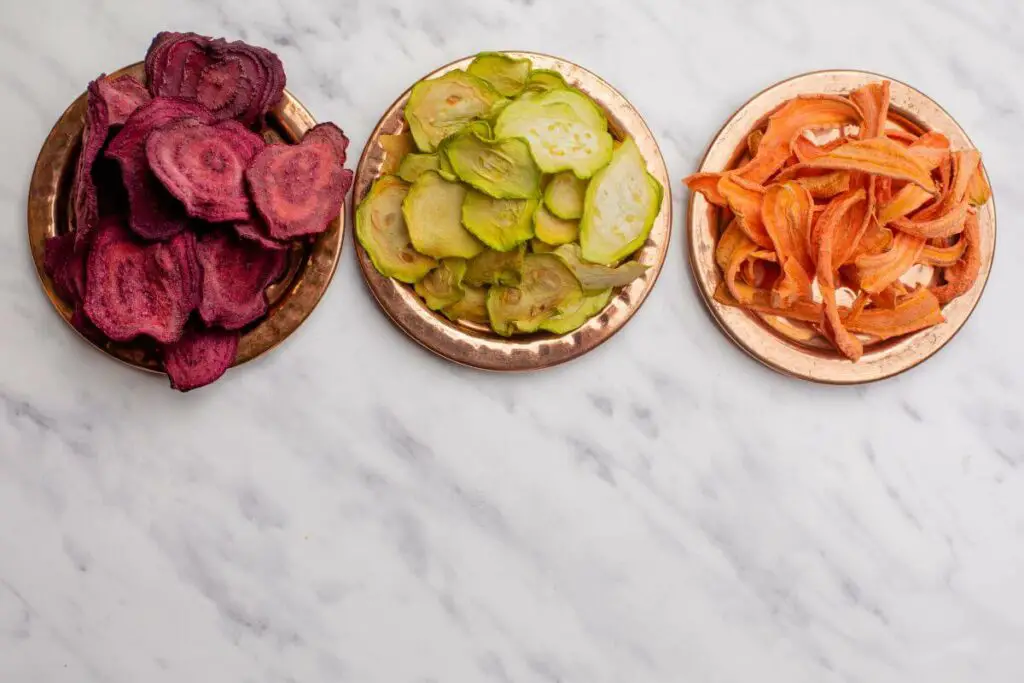
- IBS-Friendly Snacks Matter: Snacking isn’t just about staving off hunger; it’s a key component of managing IBS. Thoughtful snack choices can help regulate bowel movements and prevent uncomfortable symptoms like bloating and gas.
- What Snacks to Avoid: High-Fat, High-FODMAP, and Artificial Ingredients: Snacks to steer clear of include high-fat and high-FODMAP foods, as well as those containing artificial sweeteners and caffeine, which can trigger IBS symptoms.
- Healthy Snack Ideas for IBS Sufferers: Low-FODMAP and Nutrient-Dense: Opt for snacks like low-FODMAP fruits, nuts and seeds in moderation, lactose-free dairy, gluten-free grains, and homemade snack bars for gentle, sustained energy.
- Fresh Fruit Options: Berries, Bananas, and More: Low-FODMAP fruits like berries and bananas are nutrient-dense and gentle on the gut, making them ideal for IBS-friendly snacking.
- Vegetable Crisps: A Crunchy Alternative: Homemade vegetable crisps are a nutrient-dense, fiber-rich, and gut-friendly alternative to traditional high-fat snacks.
- Protein-Packed Snacks: Tofu, Quinoa, and Legumes: Plant-based proteins like tofu, quinoa, and legumes can help stabilize blood sugar and keep you feeling full, essential for managing IBS.
- Final Thoughts: Embracing a Diverse IBS-Friendly Snack Routine: The key to managing IBS through snacking is to be intentional and observant. Every person’s gut is unique, so don’t be afraid to experiment with different ingredients and recipes.
Understanding IBS and the Importance of Healthy Snack Choices
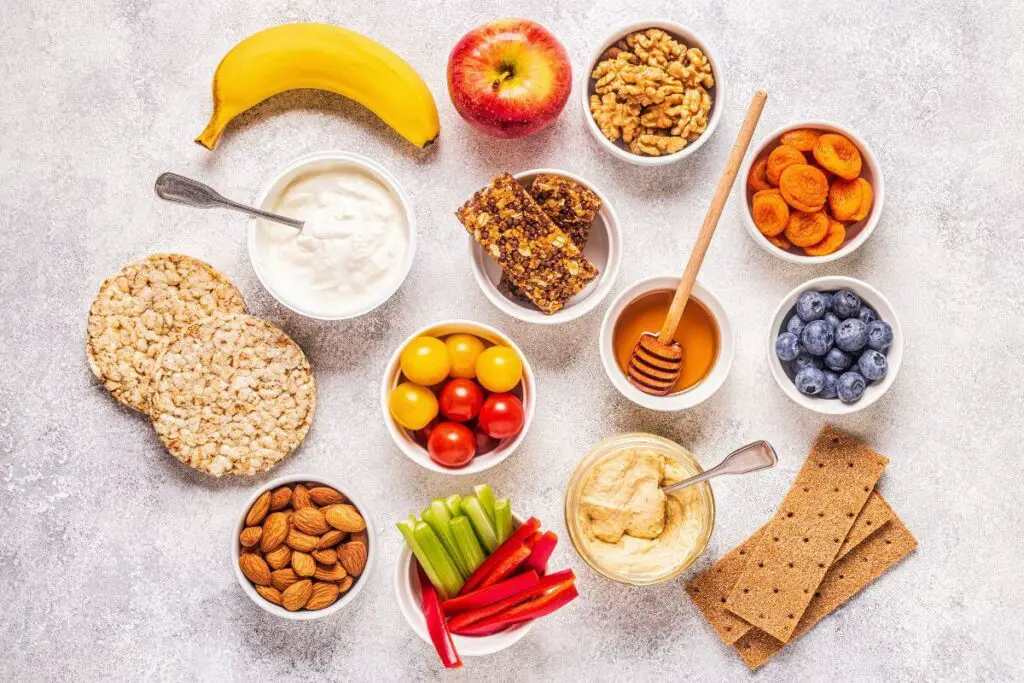
IBS can be a real pain in the… well, you know where. But when it comes to managing IBS, it’s not just about what you eat at mealtime but also what you snack on. The choices you make between meals can significantly impact your digestive comfort and overall well-being.
Why Healthy Snack Choices Matter for IBS Management
- Snacks can either support or sabotage your digestive health.
- Eating small, frequent meals and snacks can help regulate bowel movements and prevent uncomfortable bloating and gas.
- IBS symptoms can be triggered by certain ingredients commonly found in snacks, such as artificial sweeteners, high-fat foods, and caffeine.
- Opting for nourishing, low-FODMAP, and easily digestible snacks can provide sustained energy and prevent sudden hunger pangs that can exacerbate IBS symptoms.
- By making mindful snack choices, you can support your gut health and reduce the likelihood of IBS flare-ups.
Remember, the key to managing IBS is not just about what you eat but also how you eat. By being mindful of your snack choices and portion sizes, you can better control your IBS symptoms and enjoy a happier, healthier gut.
Top Gut-Friendly Snacks for IBS
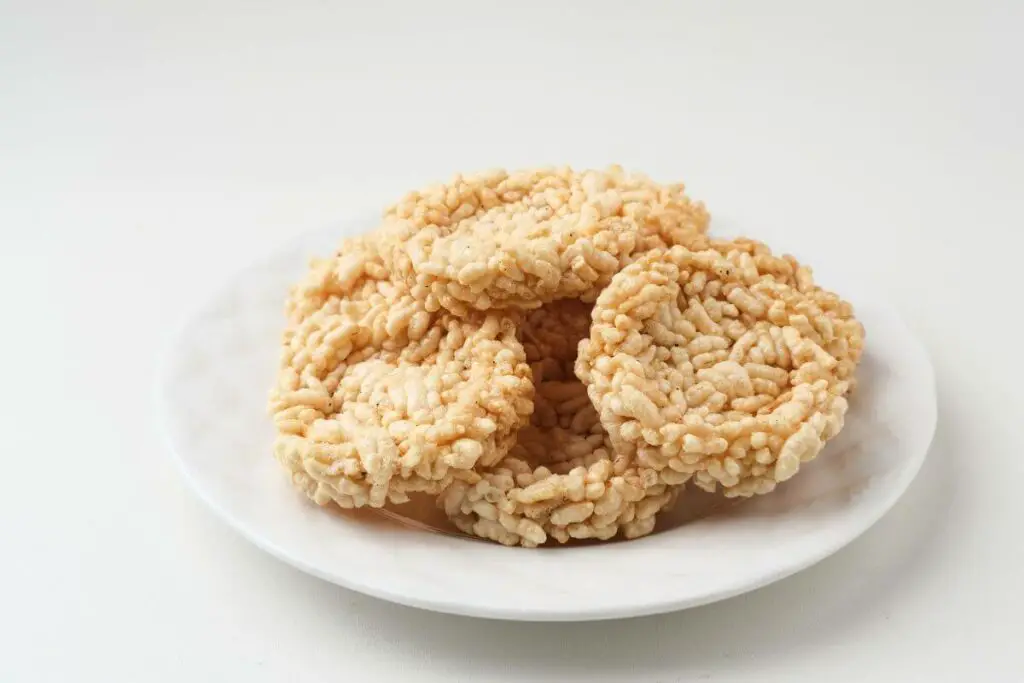
If you’re dealing with IBS, finding the right snacks can be a game-changer. The best gut-friendly snacks for IBS are those that are easy to digest, low in FODMAPs, and gentle on your stomach.
Let’s explore some delicious and nutritious snack options that can keep your IBS symptoms in check while satisfying your cravings. Don’t forget to keep your food diary to make note of effects of eating specific snacks.
1. Quick IBS-Friendly Snack Ideas
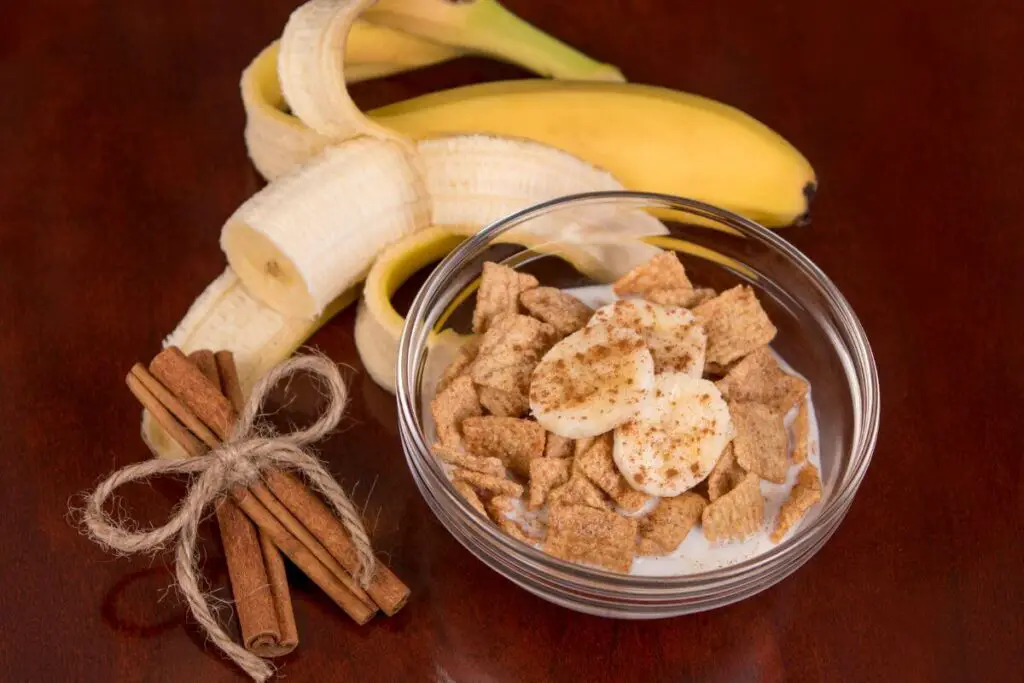
- Rice Crackers and Cakes with Almond Butter: A simple yet satisfying snack that’s low in FODMAPs. The combination of rice cakes and almond butter provides a good balance of carbohydrates, healthy fats, and protein.
- Banana with a Sprinkle of Cinnamon: Bananas are a great source of potassium and fiber, and the addition of cinnamon can add a flavorful twist without triggering your symptoms.
- Carrot Sticks with Hummus: Carrots are low in FODMAPs and hummus provides a good source of plant-based protein. This snack is not only gut-friendly but also crunchy and delicious.
- Greek Yogurt with Berries: Opt for lactose-free or low-lactose Greek yogurt and top it with your favorite low-FODMAP berries like strawberries or blueberries. This snack is rich in probiotics and antioxidants.
- Oatmeal: A warm bowl of oatmeal can be a comforting and gut-friendly snack. Make it with lactose-free milk or water and top it with a small amount of low-FODMAP fruits or a sprinkle of nuts.
- Hard-Boiled Eggs: Eggs are a great source of protein and are low in FODMAPs. They’re also easy to prepare and can be a quick, on-the-go snack.
- Homemade Trail Mix: Create your own trail mix using low-FODMAP nuts like almonds and macadamia nuts, along with a small portion of dark chocolate or dried fruits like cranberries or pineapple.
- Quinoa Salad: Quinoa is a low-FODMAP grain that can be the base for a delicious and nutritious salad. Add in some low-FODMAP vegetables like bell peppers and cucumbers, and dress it with a simple olive oil and lemon juice vinaigrette.
- Chia Seed Pudding: Chia seeds are a good source of fiber and healthy fats. Mix them with lactose-free milk, a touch of maple syrup, and some vanilla extract for a delicious and gut-friendly pudding.
- Low-FODMAP Smoothies: Blend together low-FODMAP fruits like kiwi, pineapple, and spinach with a lactose-free or plant-based milk for a refreshing and nutritious snack.
When it comes to IBS, it’s important to pay attention to portion sizes and how your body responds to different foods. These snack options are a great starting point, but it’s always best to personalize your choices based on your unique sensitivities and preferences.
And before we move on to more low-FODMAP snack ideas, staying hydrated is key for overall gut health, so don’t forget to pair your snacks with a glass of water or a soothing herbal tea.
2. Low-FODMAP Snack Options Overview
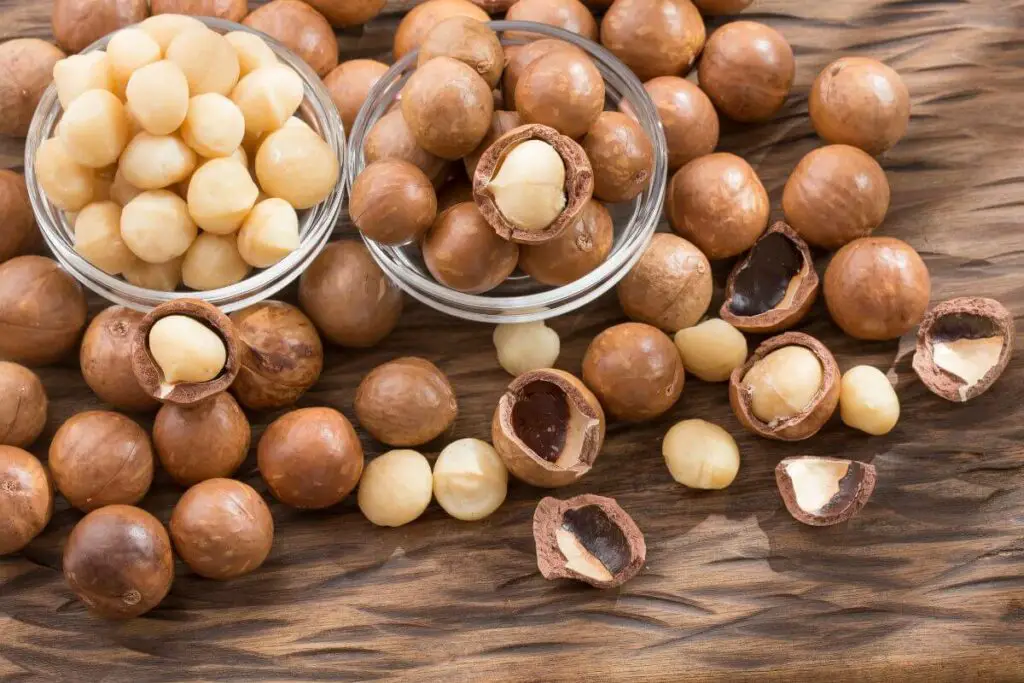
Low-FODMAP foods are like the VIPs of the IBS snack world. They’re your go-to for keeping your tummy happy and your taste buds satisfied. But why are they so great for IBS? Well, let’s break it down.
FODMAPs are types of carbohydrates that can ferment in your gut, leading to symptoms like bloating, gas, and stomach pain – not exactly the party you want in your belly. By choosing low-FODMAP snacks, you’re reducing the chances of these unwelcome guests crashing your digestive system.
When you reach for a low-FODMAP snack, you’re often getting a good balance of macronutrients – protein, carbohydrate, and fat – which is like giving your gut a high-five. Plus, many low-FODMAP options are rich in dietary fiber, an essential nutrient for gut health.
So, what are some of these superstar snacks? Think rice cakes with almond butter, strawberries with lactose-free yogurt, or a handful of macadamia nuts. The key is to mix and match your low-FODMAP foods to create a variety of tasty snacks that also support your overall health.
If you’re an IBS sufferer, consider these low-FODMAP snack options as your trusty sidekicks, always there to keep your digestive system on the right track.
3. Fresh Fruit Options: Berries, Bananas, and More
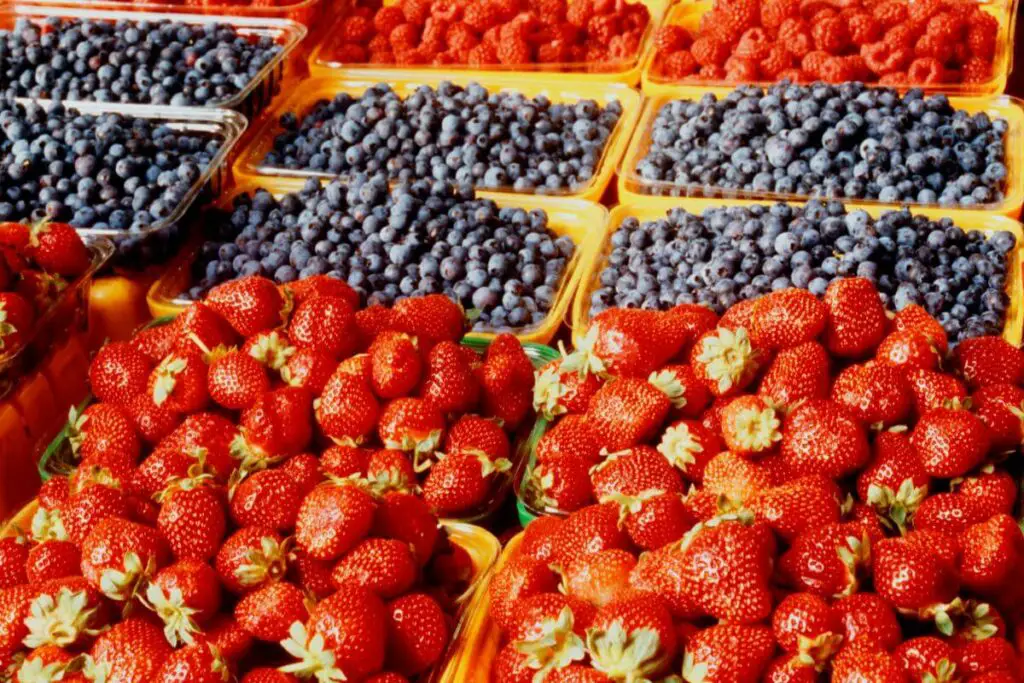
Fruits are nature’s candy, and for those with IBS, they can be a sweet, safe snack. Low-FODMAP fruits like berries and bananas are gentle on the gut, providing essential nutrients and fiber without triggering symptoms.
Here’s how you can enjoy these fruity delights without the IBS drama:
- Berries: Strawberries, blueberries, and raspberries are low in fermentable sugars, making them IBS-friendly. A cup of mixed berries with a dollop of lactose-free yogurt can make a delicious and soothing snack.
- Bananas: This potassium-rich fruit is a gut superstar. Enjoy half a banana with a handful of low-FODMAP nuts like almonds or macadamias for a satisfying and tummy-friendly treat.
- Serving Sizes: Moderation is key. Stick to recommended serving sizes to avoid overloading your system. For berries, a serving is typically 1 cup, while for bananas, half a medium-sized fruit is ideal.
- Combinations: Pairing low-FODMAP fruits with protein or healthy fats can further aid digestion and keep you feeling fuller for longer.
When you’re craving something sweet or refreshing, these low-FODMAP fruits can be your go-to allies. Just remember, everyone’s gut is different, so it’s essential to listen to your body and adjust your snack choices accordingly.
Read more about Safe Fruits for IBS Sufferers.
4. Vegetable Crisps: A Crunchy Alternative
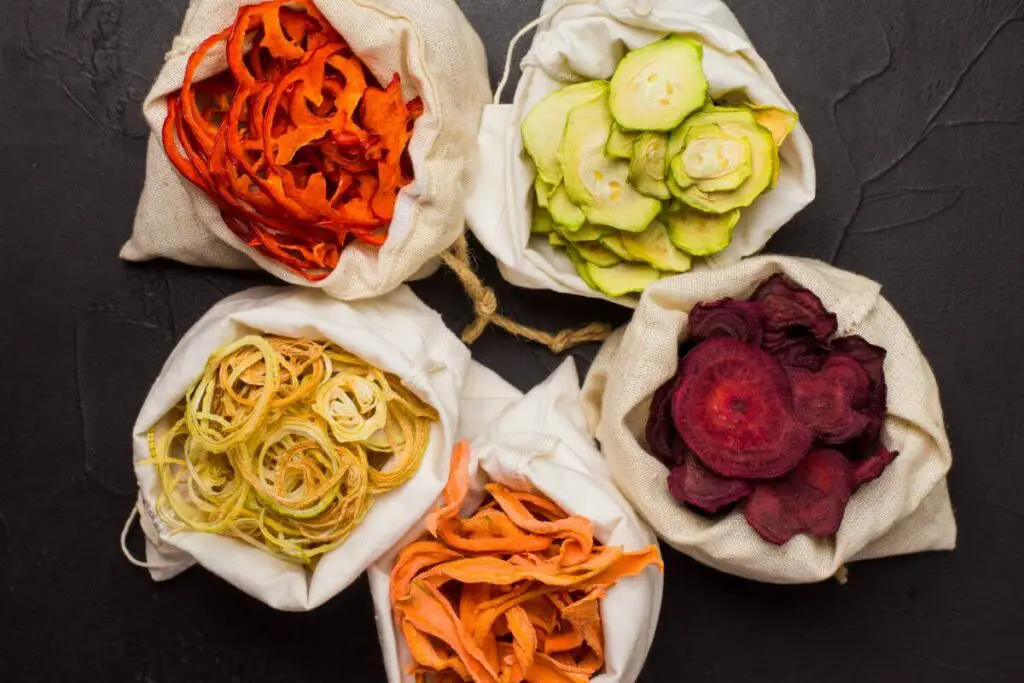
Craving that satisfying crunch? Ditch the greasy potato chips and opt for homemade vegetable crisps instead. Not only are they easy to make, but they’re also a gut-friendly snack that won’t trigger your IBS symptoms. Here’s how to do it:
- Choose the Right Veggies: Vegetables like carrots, sweet potatoes, beets, and zucchinis are perfect for crisping. They’re low in FODMAPs and high in fiber, which can aid in digestion.
- Slice and Dice: Use a mandoline slicer or a sharp knife to cut your veggies into thin, uniform slices. This ensures even cooking and that satisfying crunch.
- Season Smart: Instead of reaching for high-sodium seasonings, try a sprinkle of sea salt or low-FODMAP spices like paprika, cumin, or a dash of garlic-infused oil. These add flavor without the IBS upset.
- Baking is Key: Preheat your oven to 375°F (190°C). Lay the veggie slices on a parchment-lined baking sheet, ensuring they don’t overlap. Bake for 15-20 minutes or until they’re golden and crispy. Keep an eye on them to prevent burning.
- Cool and Enjoy: Let the crisps cool for a few minutes to achieve maximum crunch, then dive in!
Why Vegetable Crisps Are a Smart Choice:
- They’re nutrient-dense and rich in vitamins and minerals.
- The high fiber content can promote gut health and regularity.
- By making them at home, you can control the ingredients and avoid IBS triggers often found in store-bought snacks.
Remember, portion control is key even with healthy snacks. Enjoy your homemade vegetable crisps in moderation, paired with a protein like a low-lactose cheese or a handful of low-FODMAP nuts for a balanced, gut-friendly treat.
Learn more about the Best Vegetables for IBS.
5. Protein-Packed Snacks: Tofu, Quinoa, and Legumes
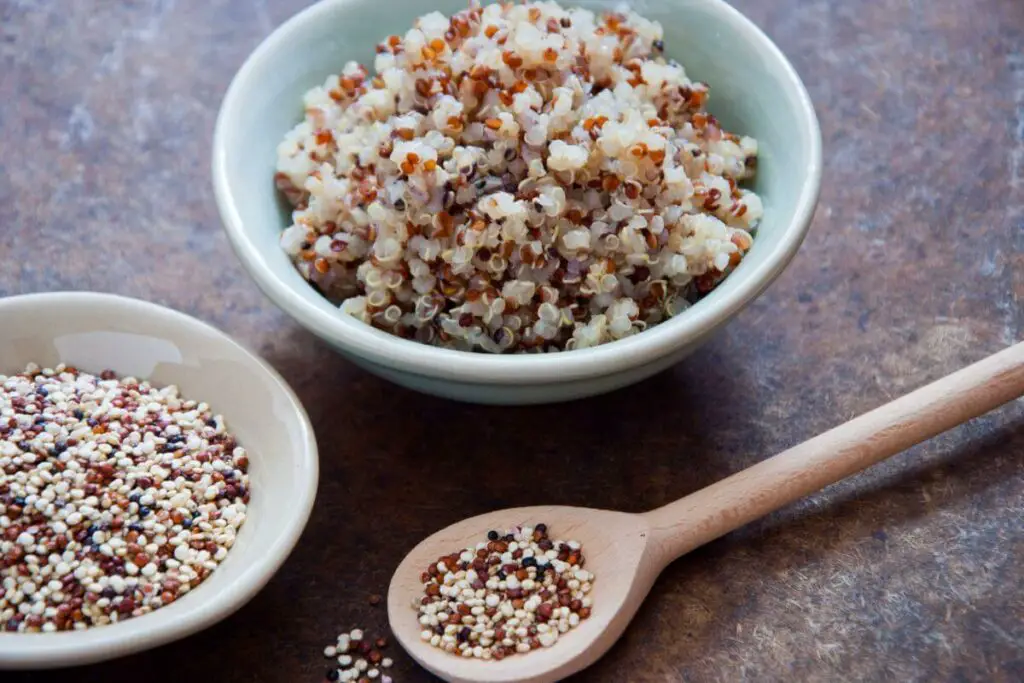
Protein is a powerhouse nutrient that can help stabilize blood sugar levels and keep you feeling full, both of which are crucial for managing IBS. When it comes to protein-rich snacks for IBS, think outside the meat and dairy box and consider options like tofu, quinoa, and legumes. These plant-based sources of protein are not only gut-friendly but also versatile and delicious.
Why Protein is Key for IBS: Protein helps in the repair and maintenance of body tissues, including the gut lining. It’s also essential for the production of digestive enzymes and hormones that aid in the breakdown and absorption of nutrients.
Tofu: This soy-based protein is a gut-friendly option that can be enjoyed in various ways, from marinated and grilled to blended into smoothies for a protein boost.
Quinoa: As a complete protein, quinoa contains all nine essential amino acids and is easy to digest. You can prepare it as a salad, mix it into a stir-fry, or even bake it into protein bars for a convenient snack.
Legumes: Beans, lentils, and chickpeas are rich in fiber and protein, making them a double win for IBS management. To make them easier to digest, try soaking them before cooking or opting for canned varieties, which are often more gut-friendly.
Preparation Tips: To make these protein-packed snacks even more gut-friendly, consider the following preparation tips:
- Soak legumes before cooking to reduce their gas-producing properties.
- Choose softer tofu varieties if you have trouble digesting firmer textures.
- Rinse quinoa thoroughly before cooking to remove saponins, which can cause digestive discomfort in some people.
To make the most of these protein-packed snacks, aim for small, frequent meals throughout the day rather than a few large ones. This can help prevent overloading your digestive system and minimize IBS symptoms. Remember, every gut is different, so listen to your body and adjust your protein intake based on what works best for you.
Learn more about IBS and Protein Foods.
6. Lactose-Free Dairy Delights: Yogurt and Cheese Alternatives
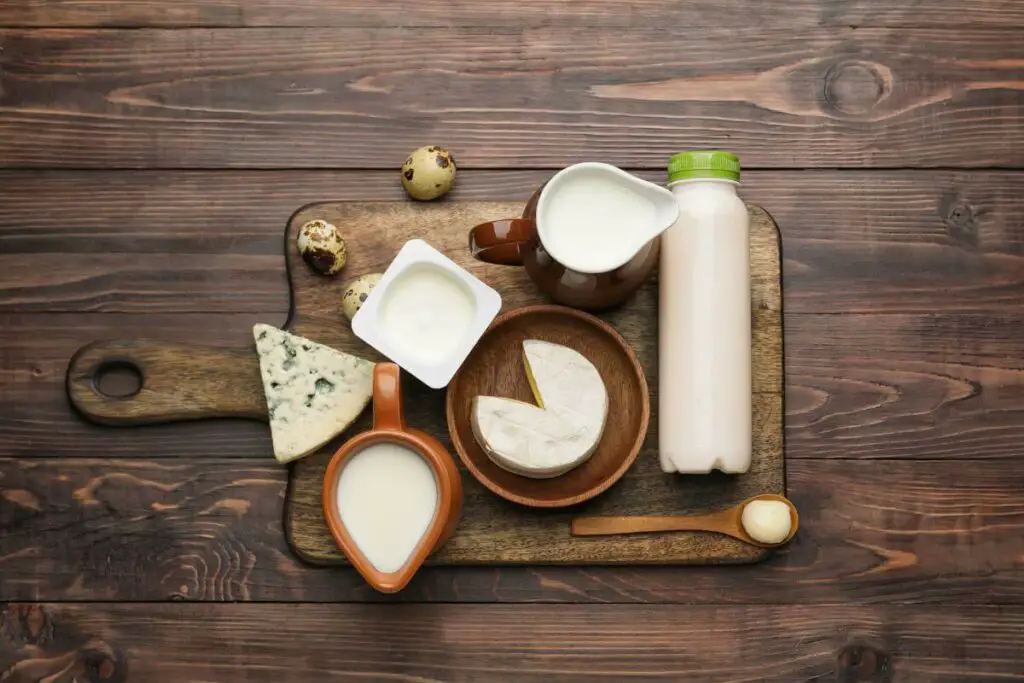
If you’re lactose intolerant but still crave that creamy dairy goodness, you’re in luck. Lactose-free yogurt and cheese alternatives can be your go-to healthy snacks. These options are not only gentle on your stomach but also pack a probiotic punch that can work wonders for your IBS.
Why Probiotics Matter: Probiotics are live bacteria and yeasts that are good for your digestive system. They help maintain the natural balance of organisms in your gut, which can be thrown off in those with IBS. Studies have shown that certain probiotics can help reduce IBS symptoms like gas, bloating, and irregular bowel movements.
Lactose-Free Yogurt: Opt for yogurt made from lactose-free milk or even non-dairy alternatives like almond or coconut milk. These yogurts are rich in probiotics and can be topped with IBS-friendly fruits like bananas or blueberries for a delicious and nutritious snack.
Cheese Alternatives: If you’re a cheese lover, lactose-free cheese is a fantastic option. You can pair it with gluten-free crackers or enjoy it as a topping on a rice cake. The key is to choose varieties that are low in lactose, such as aged cheddar or Swiss.
Lactose Intolerance vs. Dairy Allergy: It’s important to note that lactose intolerance is not the same as a dairy allergy. Lactose intolerance is a digestive issue, while a dairy allergy is an immune system response. If you’re unsure which one you have, consult with a healthcare professional for guidance.
Incorporating these lactose-free dairy delights into your snacking routine can not only provide a satisfying treat but also contribute to the overall health of your gut. So go ahead, indulge in a creamy, probiotic-rich snack that your stomach will thank you for.
Read more about IBS and Dairy Products.
7. Gluten-Free Grains: Safe Breads and Cereals
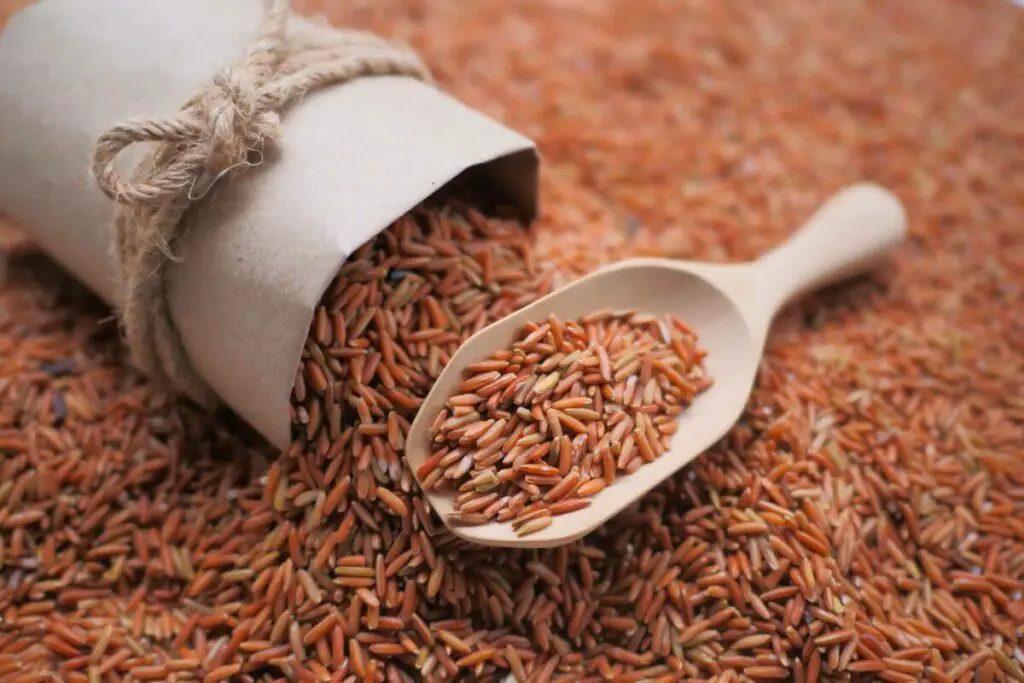
When it comes to IBS and your gut, going gluten-free can often be a game-changer. But don’t worry, you’re not relegated to a life without bread or cereal. There’s a whole world of gluten-free grains waiting for you to explore.
Here are some gluten-free grains that are gentle on your gut and perfect for creating a variety of snacks:
- Quinoa: This versatile grain can be used to make gluten-free bread or added to homemade granola for a satisfying crunch.
- Brown rice: Use brown rice flour to make gluten-free bread or enjoy a bowl of brown rice cereal with a splash of almond milk.
- Oats: Opt for certified gluten-free oats and use them to make oatmeal cookies or a quick granola bar for an on-the-go snack.
The key is to look for gluten-free options and experiment with recipes that suit your taste buds and your gut. You can even try making your own gluten-free bread at home for a more personalized touch.
Just because you’re avoiding gluten doesn’t mean you have to miss out on your favorite snacks. With a little creativity and some gluten-free grains in your pantry, you can enjoy IBS-friendly breads and cereals that keep your tummy happy.
Learn more about the Gluten IBS Connection.
8. Nut and Seed Butters: Smooth and Satisfying
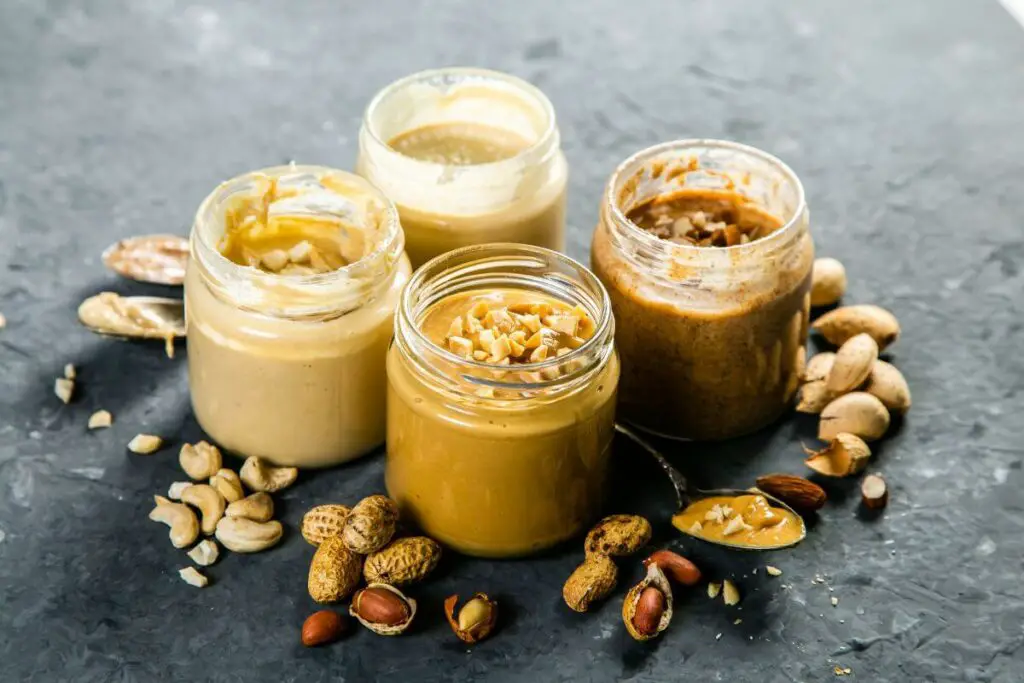
If you’re an IBS sufferer, nut and seed butters can be a nutrient-packed, tummy-friendly snack option. They are rich in healthy fats, protein, and various essential nutrients. However, not all nut butters are created equal, and some might trigger IBS symptoms due to their fiber content or specific nuts used.
Here’s how to make the most of these creamy, satisfying spreads while keeping your gut happy:
- Opt for Low-FODMAP Varieties: Some nut and seed butters, like almond or peanut butter, can be high in FODMAPs, which are fermentable carbohydrates that can trigger IBS symptoms. Look for low-FODMAP options or limit your portion size to keep symptoms at bay.
- Seed Butters: If you’re looking to switch things up, seed butters like sunflower seed or pumpkin seed butter are excellent alternatives. They offer a similar creamy texture and are often lower in FODMAPs compared to some nut butters.
- Pair with Low-FODMAP Foods: Enjoy your nut or seed butter with low-FODMAP fruits like bananas or strawberries, or spread it on a rice cake or gluten-free toast for a satisfying snack that’s gentle on your gut.
- Portion Control: Nut and seed butters are calorie-dense, so be mindful of portion sizes. A serving size is typically 1-2 tablespoons, which is enough to provide you with the nutrients and energy boost you need without overloading your system.
When it comes to choosing nut and seed butters, always read the ingredient list. Look for options with minimal added sugars, oils, or artificial ingredients. Remember, what works for one person with IBS may not work for another, so it’s essential to pay attention to your body’s responses.
Nut and seed butters can be a delicious and satisfying addition to your IBS-friendly snack repertoire. Just be sure to choose wisely and enjoy them in moderation to keep your gut happy.
9. Homemade Snack Bars: Customizable and Convenient
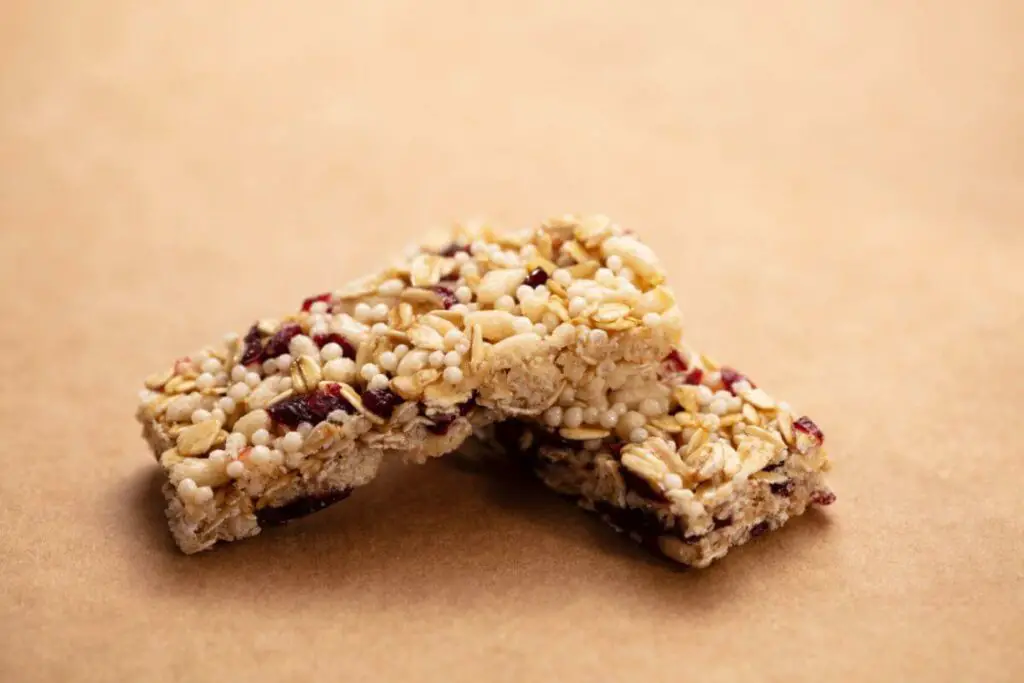
Making your own low-FODMAP snack bars is a game changer for IBS-friendly snacking. Not only are they customizable to your dietary needs, but they’re also incredibly convenient. Here’s a simple recipe to get you started:
Ingredients:
- 1 cup rolled oats (ensure they’re certified gluten-free if necessary)
- 1/2 cup unsweetened shredded coconut
- 1/2 cup pumpkin seeds
- 1/2 cup sunflower seeds
- 1/2 cup chopped pecans
- 1/2 cup maple syrup
- 1/2 cup melted coconut oil
- 1 teaspoon vanilla extract
- 1/2 teaspoon ground cinnamon
- A pinch of salt
Instructions:
- Preheat your oven to 350°F (175°C).
- In a large bowl, mix together the oats, coconut, seeds, and pecans.
- In a separate bowl, whisk together the maple syrup, melted coconut oil, vanilla, cinnamon, and salt.
- Pour the liquid mixture over the dry ingredients and stir until everything is well coated.
- Press the mixture firmly into a lined 9×9-inch baking pan.
- Bake for 20-25 minutes or until the edges are golden brown.
- Let the bars cool completely before cutting into desired sizes.
The beauty of homemade snack bars is that you can swap ingredients to suit your individual tolerances. For example, if you’re sensitive to nuts, you can omit them and add more seeds or even a low-FODMAP granola. Psyllium is a great addition for added fiber, but be mindful of your personal response to it.
Snacks to Avoid: Common IBS Triggers
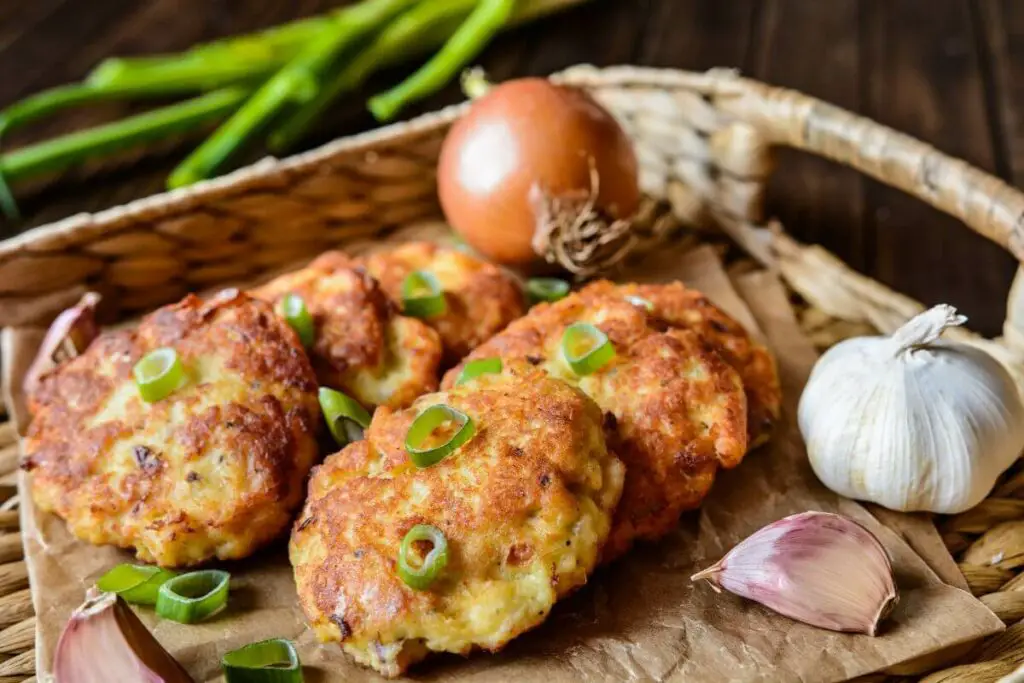
While low-FODMAP snacks are your best friends, there are some snacks that can turn your digestive system into a rollercoaster you never wanted to ride.
To keep your IBS symptoms in check, it’s best to avoid these snacks or consume them in moderation.
- High-FODMAP foods: Like onions and garlic, which can cause digestive distress. These are like the troublemakers at the party, causing chaos in your gut. They include foods like wheat, certain fruits, and dairy products high in lactose.
- Caffeine: Found in coffee, tea, and some sodas, it can stimulate the intestines and worsen symptoms. Caffeine can speed up your digestive system, leading to diarrhea or stomach cramps.
- High-fat foods: While delicious, foods high in fat can be hard for your gut to process, leading to discomfort and potential flare-ups.These can be hard to digest and may lead to diarrhea or constipation.
Smart Snacking Tips for IBS Management
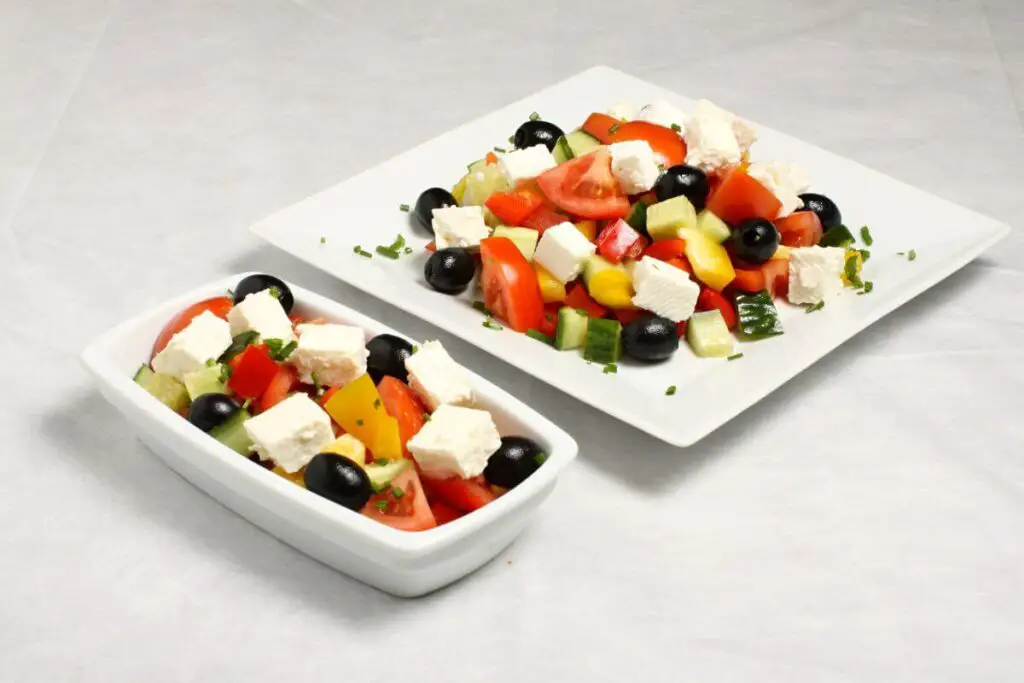
When it comes to snacking with IBS, a little strategy goes a long way. Here are some smart snacking tips to keep your digestive system happy:
- Stick to small portions: Large meals can trigger symptoms, so opt for smaller, more frequent snacks.
- Mind your meal timing: Eating at regular intervals can help regulate bowel movements.
- Balance your nutrients: Include a mix of macronutrients – carbs, protein, and healthy fats – in your snacks for sustained energy and satiety.
Some balanced snack ideas include a hard-boiled egg with a small piece of low-FODMAP fruit, or a rice cake with a smear of low-FODMAP hummus. By being mindful of what you snack on and how you snack, you can better manage your IBS symptoms and keep your gut in a happy place.
Snacks for IBS: Final Thoughts
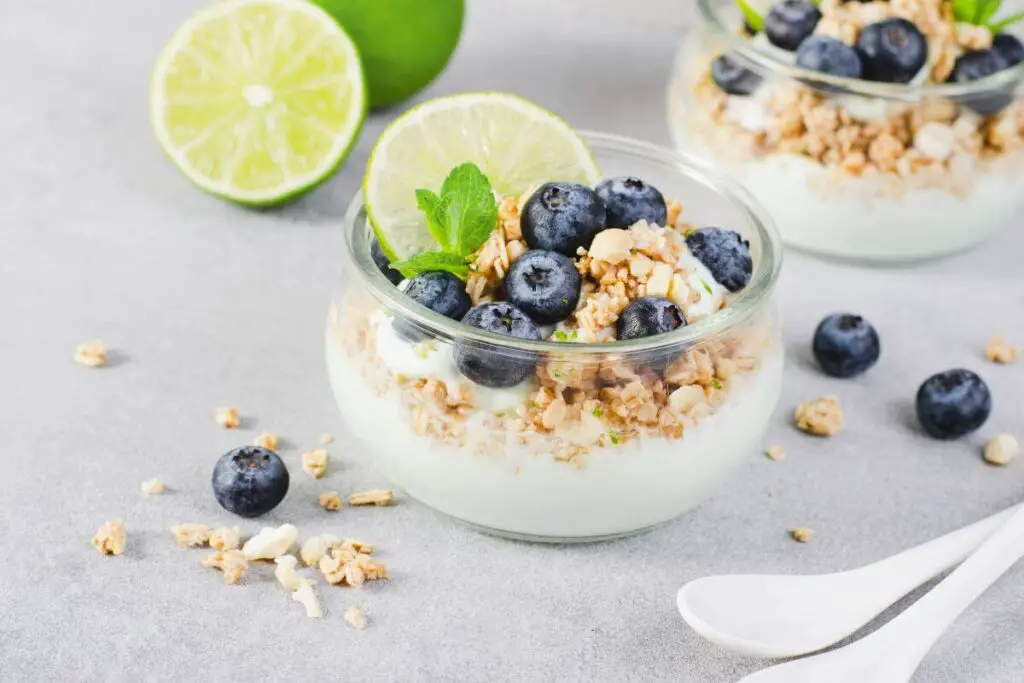
Navigating life with IBS can be challenging, but by paying attention to your snack choices, you can significantly impact your digestive comfort and overall well-being. The key is to be intentional and observant, understanding that what works for one person’s gut may not work for another.
By incorporating a diverse range of IBS-friendly snacks, from low-FODMAP fruits and vegetable crisps to protein-packed options and homemade snack bars, you can enjoy sustained energy and prevent sudden hunger pangs that can exacerbate IBS symptoms.
So, as you venture into the world of IBS-friendly snacking, remember to listen to your body, make mindful snack choices, and be open to experimenting with different ingredients and recipes. Your gut health is unique, and with the right approach to snacking, you can support your gut, reduce the likelihood of IBS flare-ups, and enjoy a happier, healthier you.
- https://www.ncbi.nlm.nih.gov/labs/pmc/articles/PMC8417072/
- https://www.ncbi.nlm.nih.gov/pmc/articles/PMC4944381/pdf/nihms745800.pdf
- https://www.ncbi.nlm.nih.gov/pubmed/28846594
- https://www.niddk.nih.gov/health-information/digestive-diseases/irritable-bowel-syndrome/symptoms-causes
- https://www.healthline.com/health/yogurt-and-ibs

